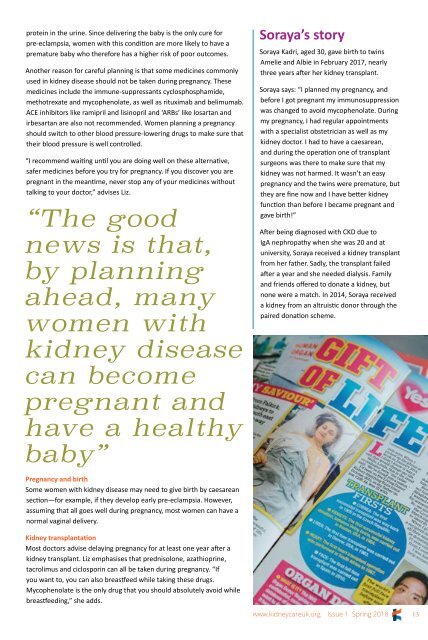Kidney Matters - Issue 1, Spring 2018
Kidney Matters is a quarterly magazine for everyone affected by kidney disease in the UK. We know that being a kidney patient can be tough at times and that accessing the right help at the right time isn’t always easy. We’ve spent a great deal of time over the past year talking to kidney patients on dialysis, asking them what we can do to address this. The response was overwhelmingly ‘improved communication’ on what is going on in the kidney world and what is available to them in terms of support and how to access it. Kidney Matters has been developed to tackle this as well as the many other issues kidney patients face in day-to-day life. Along with shared patient experiences, Kidney Matters provides on how to access emotional and practical support, financial assistance through our grant schemes, advice from leading kidney specialists and tips on how to keep as well as possible by eating a healthy diet whilst on dialysis
Kidney Matters is a quarterly magazine for everyone affected by kidney disease in the UK.
We know that being a kidney patient can be tough at times and that accessing the right help at the right time isn’t always easy. We’ve spent a great deal of time over the past year talking to kidney patients on dialysis, asking them what we can do to address this. The response was overwhelmingly ‘improved communication’ on what is going on in the kidney world and what is available to them in terms of support and how to access it.
Kidney Matters has been developed to tackle this as well as the many other issues kidney patients face in day-to-day life. Along with shared patient experiences, Kidney Matters provides on how to access emotional and practical support, financial assistance through our grant schemes, advice from leading kidney specialists and tips on how to keep as well as possible by eating a healthy diet whilst on dialysis
You also want an ePaper? Increase the reach of your titles
YUMPU automatically turns print PDFs into web optimized ePapers that Google loves.
protein in the urine. Since delivering the baby is the only cure for<br />
pre-eclampsia, women with this condition are more likely to have a<br />
premature baby who therefore has a higher risk of poor outcomes.<br />
Another reason for careful planning is that some medicines commonly<br />
used in kidney disease should not be taken during pregnancy. These<br />
medicines include the immune-suppressants cyclosphosphamide,<br />
methotrexate and mycophenolate, as well as rituximab and belimumab.<br />
ACE inhibitors like ramipril and lisinopril and ‘ARBs’ like losartan and<br />
irbesartan are also not recommended. Women planning a pregnancy<br />
should switch to other blood pressure-lowering drugs to make sure that<br />
their blood pressure is well controlled.<br />
“I recommend waiting until you are doing well on these alternative,<br />
safer medicines before you try for pregnancy. If you discover you are<br />
pregnant in the meantime, never stop any of your medicines without<br />
talking to your doctor,” advises Liz.<br />
“The good<br />
news is that,<br />
by planning<br />
ahead, many<br />
women with<br />
kidney disease<br />
can become<br />
pregnant and<br />
have a healthy<br />
baby”<br />
Soraya’s story<br />
Soraya Kadri, aged 30, gave birth to twins<br />
Amelie and Albie in February 2017, nearly<br />
three years after her kidney transplant.<br />
Soraya says: “I planned my pregnancy, and<br />
before I got pregnant my immunosuppression<br />
was changed to avoid mycophenolate. During<br />
my pregnancy, I had regular appointments<br />
with a specialist obstetrician as well as my<br />
kidney doctor. I had to have a caesarean,<br />
and during the operation one of transplant<br />
surgeons was there to make sure that my<br />
kidney was not harmed. It wasn’t an easy<br />
pregnancy and the twins were premature, but<br />
they are fine now and I have better kidney<br />
function than before I became pregnant and<br />
gave birth!”<br />
After being diagnosed with CKD due to<br />
IgA nephropathy when she was 20 and at<br />
university, Soraya received a kidney transplant<br />
from her father. Sadly, the transplant failed<br />
after a year and she needed dialysis. Family<br />
and friends offered to donate a kidney, but<br />
none were a match. In 2014, Soraya received<br />
a kidney from an altruistic donor through the<br />
paired donation scheme.<br />
Pregnancy and birth<br />
Some women with kidney disease may need to give birth by caesarean<br />
section—for example, if they develop early pre-eclampsia. However,<br />
assuming that all goes well during pregnancy, most women can have a<br />
normal vaginal delivery.<br />
<strong>Kidney</strong> transplantation<br />
Most doctors advise delaying pregnancy for at least one year after a<br />
kidney transplant. Liz emphasises that prednisolone, azathioprine,<br />
tacrolimus and ciclosporin can all be taken during pregnancy. “If<br />
you want to, you can also breastfeed while taking these drugs.<br />
Mycophenolate is the only drug that you should absolutely avoid while<br />
breastfeeding,” she adds.<br />
www.kidneycareuk.org <strong>Issue</strong> 1 <strong>Spring</strong> <strong>2018</strong> 13


















